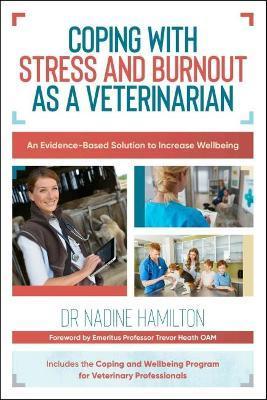Coping with Stress and Burnout as a Veterinarian: An Evidence-Based Solution to Increase Wellbeing

Coping with Stress and Burnout as a Veterinarian: An Evidence-Based Solution to Increase Wellbeing
The best way to tackle the unique nature of veterinary stress that can lead to anxiety, depression and suicide is to use evidence-based research to create an intervention able to have a scientifically measurable positive impact on wellbeing. That's why psychologist Dr Nadine Hamilton wrote this book after spending over 15 years researching, working with thousands of stressed vets, and consulting with industry associations, practice managers and owners. This unique resource combines reading on mindfulness, positive psychology, wellbeing, and resiliency training with a 'toolkit' of practical tasks and tips to teach people how to cope with everyday pressures, so they no longer feel suicide is the only way out. Its approach has been tested with statistically significant results showing reduced stress, depression, and anxiety. Being a veterinarian can be a rewarding career requiring a passion for animals, excellent interpersonal skills and a strong work ethic. It can also be stressful. So stressful, that the suicide rate for veterinarians is almost four times higher than the general population across the UK, Australia, US, New Zealand and Canada. The effects of working long hours, performing euthanasia on animals, emotional pressure, financial issues, unrealistic expectations, and dealing with distressed clients place considerable stress on both the vet themselves and their families at home. Failure to cope with such stress upsets mental wellbeing and can lead to serious emotional, physical, and behavioural issues, including self-harm. Nadine Hamilton's postgraduate research focussed on how key evidence-based psychological strategies could be used to decrease the risk of psychological ill-health and suicide by vets due to their day-to-day stress levels. What she found was that the best way to tackle the unique nature of veterinary stress was to combine certain psychoeducational elements. That meant specific education on the principles of positive psychology, mindfulness, and ACT along with a 'toolkit' of practical tasks from these fields. Combining these elements with supportive strategies such as stress management and communication tips results in a holistic intervention able to have a scientifically measurable positive impact on wellbeing. Coping with Stress and Burnout as a Veterinarian is a cost-effective highly accessible way to empower vets in their everyday work lives to use psychological knowledge and skills to combat stress, burnout, anxiety, depre
PRP: 247.59 Lei
Acesta este Prețul Recomandat de Producător. Prețul de vânzare al produsului este afișat mai jos.
222.83Lei
222.83Lei
247.59 LeiLivrare in 2-4 saptamani
Descrierea produsului
The best way to tackle the unique nature of veterinary stress that can lead to anxiety, depression and suicide is to use evidence-based research to create an intervention able to have a scientifically measurable positive impact on wellbeing. That's why psychologist Dr Nadine Hamilton wrote this book after spending over 15 years researching, working with thousands of stressed vets, and consulting with industry associations, practice managers and owners. This unique resource combines reading on mindfulness, positive psychology, wellbeing, and resiliency training with a 'toolkit' of practical tasks and tips to teach people how to cope with everyday pressures, so they no longer feel suicide is the only way out. Its approach has been tested with statistically significant results showing reduced stress, depression, and anxiety. Being a veterinarian can be a rewarding career requiring a passion for animals, excellent interpersonal skills and a strong work ethic. It can also be stressful. So stressful, that the suicide rate for veterinarians is almost four times higher than the general population across the UK, Australia, US, New Zealand and Canada. The effects of working long hours, performing euthanasia on animals, emotional pressure, financial issues, unrealistic expectations, and dealing with distressed clients place considerable stress on both the vet themselves and their families at home. Failure to cope with such stress upsets mental wellbeing and can lead to serious emotional, physical, and behavioural issues, including self-harm. Nadine Hamilton's postgraduate research focussed on how key evidence-based psychological strategies could be used to decrease the risk of psychological ill-health and suicide by vets due to their day-to-day stress levels. What she found was that the best way to tackle the unique nature of veterinary stress was to combine certain psychoeducational elements. That meant specific education on the principles of positive psychology, mindfulness, and ACT along with a 'toolkit' of practical tasks from these fields. Combining these elements with supportive strategies such as stress management and communication tips results in a holistic intervention able to have a scientifically measurable positive impact on wellbeing. Coping with Stress and Burnout as a Veterinarian is a cost-effective highly accessible way to empower vets in their everyday work lives to use psychological knowledge and skills to combat stress, burnout, anxiety, depre
Detaliile produsului










